Are you a creative individual with a brilliant idea for a new invention, a captivating novel, or a groundbreaking design? If so, protecting your intellectual property (IP) should be a top priority. Intellectual property law safeguards your original creations, granting you exclusive rights to use, exploit, and profit from them. In today’s competitive landscape, securing your IP is crucial for safeguarding your hard work and maximizing its value.
Navigating the complex world of intellectual property law can be daunting, especially for individuals and businesses unfamiliar with the intricacies of patents, trademarks, copyrights, and trade secrets. This is where intellectual property lawyers come in. These legal professionals specialize in protecting your creative works and ensuring you receive the recognition and financial rewards you deserve. From advising on the best IP strategy to enforcing your rights against infringement, they provide invaluable guidance and support to help you navigate the legal landscape with confidence.
What is Intellectual Property Law?
Intellectual property law is a body of law that protects the rights of creators and inventors to their original works. It covers a wide range of creations, including literary works, musical compositions, artistic works, inventions, designs, and trademarks. This legal framework grants creators certain exclusive rights over their creations, preventing others from using, copying, or distributing their work without permission.
The purpose of intellectual property law is to encourage creativity and innovation by providing creators with economic incentives for their work. By granting creators exclusive rights to their creations, they can control how their work is used and exploited, allowing them to profit from it. This also ensures that others cannot unfairly benefit from their hard work.
Intellectual property law is an important part of the global economy, protecting the rights of creators and ensuring the free flow of ideas and information. It plays a crucial role in fostering innovation, stimulating economic growth, and protecting the interests of creators worldwide.
How Intellectual Property Lawyers Protect Your Creations
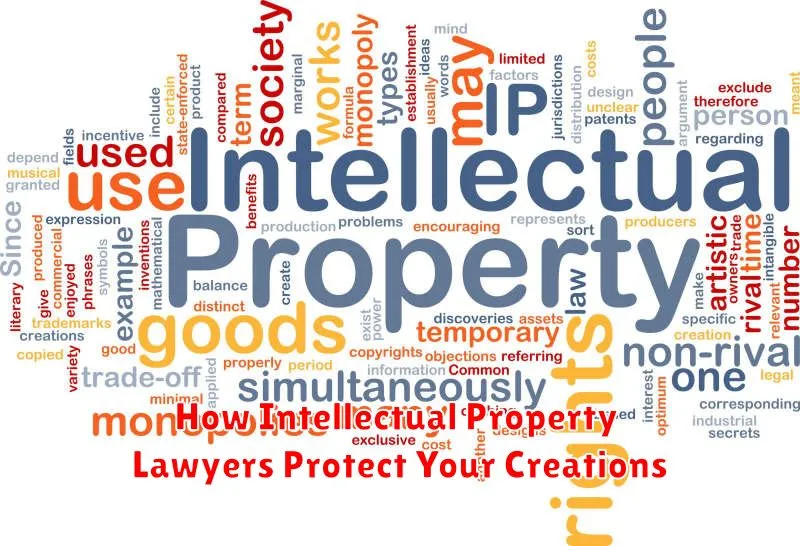
Intellectual property lawyers are experts in protecting your creative works, such as inventions, literary and artistic works, designs, and symbols. They safeguard your rights by ensuring that your creations are properly registered and enforced, preventing others from using them without your permission.
These lawyers are equipped with the knowledge and experience to navigate the complex legal landscape of intellectual property. They help you understand and navigate the process of obtaining patents, trademarks, copyrights, and trade secrets.
Beyond registration, they also provide legal counsel and representation in cases of infringement, helping you defend your rights and prevent unauthorized use of your creations.
In the face of potential threats to your intellectual property, they help you develop strategies to protect your assets and maintain your competitive edge. They also assist in licensing and commercialization, ensuring you receive the proper compensation for your creations.
When to Hire an Intellectual Property Attorney
If you are a creator, entrepreneur, or business owner, you likely have questions about protecting your intellectual property (IP). While navigating the intricacies of IP law can feel overwhelming, you don’t necessarily need an attorney from the start. However, there are specific instances where seeking legal counsel is vital for safeguarding your creative works.
Here are some crucial times to consider hiring an intellectual property attorney:
- Before you launch your product or service: A lawyer can advise you on the best way to protect your IP, whether through trademarks, patents, copyrights, or trade secrets. They can also help you draft agreements with collaborators, partners, or investors.
- When you’re considering licensing or selling your IP: A lawyer can negotiate favorable terms for you and ensure your rights are protected throughout the process.
- When you believe someone is infringing on your IP: A lawyer can help you identify and address infringement and take legal action if necessary.
- When you’re facing an IP lawsuit: A lawyer can defend you in court and protect your rights.
- When you’re entering a new market or expanding your business: A lawyer can help you understand the IP landscape in different jurisdictions and navigate any potential challenges.
Ultimately, the best time to hire an IP attorney is when you have questions or concerns about your creative works. They can provide you with the knowledge and guidance you need to protect your valuable assets.
How to Protect Patents with Legal Help
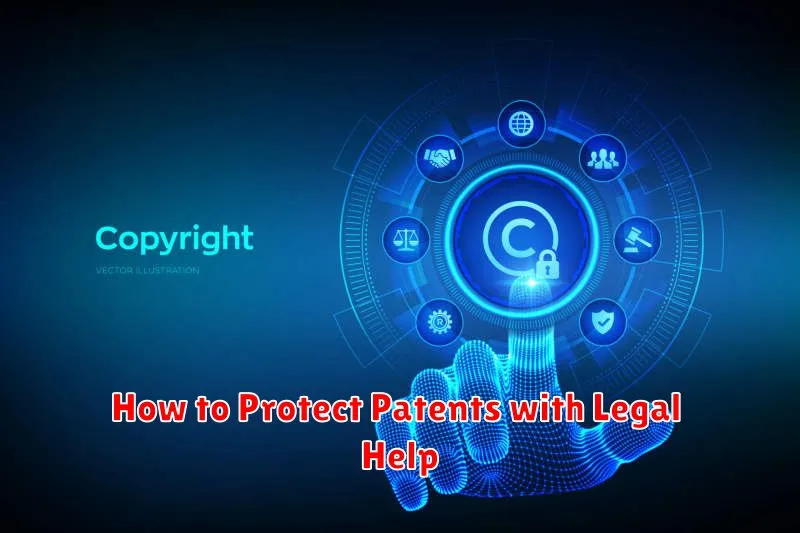
Securing a patent is a crucial step in protecting your innovative creations. Intellectual property lawyers play a vital role in navigating the complex patent process and ensuring your invention receives the legal protection it deserves. Here’s how they assist you:
1. Patent Search and Analysis: Before filing a patent application, lawyers conduct thorough searches to determine if similar inventions already exist. This analysis helps assess the novelty and non-obviousness of your invention, essential for obtaining a patent.
2. Drafting and Filing Patent Applications: Patent applications require precise language and technical details. Lawyers craft detailed applications that accurately describe your invention and its unique features, increasing the likelihood of successful patent approval.
3. Prosecution and Examination: Once filed, your application undergoes a rigorous examination by the patent office. Lawyers handle all communications with the office, respond to any objections, and advocate for your patent’s approval.
4. Patent Maintenance: Even after receiving a patent, your work isn’t finished. Lawyers help manage ongoing maintenance fees, ensure compliance with patent regulations, and protect your rights against potential infringement.
5. Enforcement: If someone infringes upon your patent, lawyers can assist with cease and desist letters, lawsuits, and other legal actions to protect your invention and secure compensation for damages.
By working with a knowledgeable and experienced intellectual property lawyer, you gain a significant advantage in the patent process. Their expertise ensures your invention receives the proper legal protection, safeguarding your innovative work and its potential commercial value.
The Role of Lawyers in Trademark Disputes
In the realm of intellectual property, trademarks are crucial assets that distinguish a company’s products or services from those of its competitors. When disputes arise regarding the use or ownership of a trademark, the role of intellectual property lawyers becomes paramount. These legal professionals are skilled in navigating the complex legal landscape surrounding trademark law, ensuring that their clients’ rights are protected.
Trademark Infringement is a serious issue that can have severe consequences for businesses. Lawyers play a critical role in identifying potential infringements, analyzing the likelihood of confusion between marks, and pursuing legal action if necessary. They are also adept at drafting cease and desist letters to prevent further infringement and negotiating settlements with the infringing party.
Trademark Litigation is another area where IP lawyers provide invaluable assistance. They represent clients in court proceedings, arguing their case before judges and juries. This involves gathering evidence, preparing legal arguments, and advocating for their client’s interests throughout the litigation process.
Beyond litigation, lawyers assist in Trademark Registration and Enforcement. They guide clients through the application process, ensuring that the trademark is properly registered with the relevant authorities. They also help clients monitor the marketplace for any potential infringement and take appropriate action to protect their rights.
The Role of Lawyers in Trademark Disputes is multifaceted and essential. They are not only legal advisors but also strategic partners who help businesses safeguard their intellectual property and prevent unauthorized use of their trademarks. By providing legal expertise, negotiation skills, and courtroom advocacy, they ensure that their clients’ creative works are protected and their business interests are safeguarded.
How Intellectual Property Attorneys Handle Copyright Infringement Cases
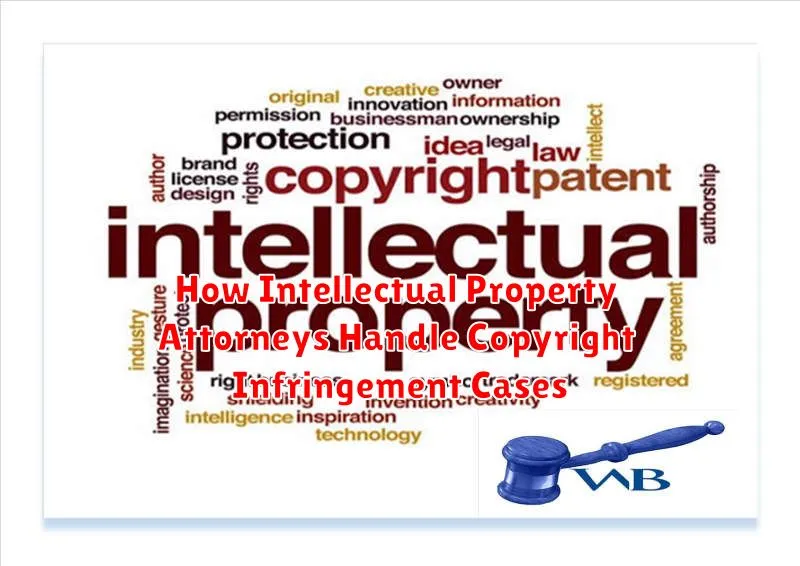
If you believe your copyright has been infringed, an intellectual property attorney can help you protect your rights. A copyright infringement case arises when someone uses your copyrighted work without your permission. This could include reproducing, distributing, performing, or displaying your work.
The first step in handling a copyright infringement case is to determine whether there is a valid copyright. The attorney will review your work to confirm that it is original and that you have the proper documentation to prove your ownership of the copyright.
If a valid copyright exists, the attorney will then investigate the alleged infringement. This may involve identifying the infringer, gathering evidence of the infringement, and determining the extent of the damages. The attorney can send a cease and desist letter to the infringer, demanding that they stop infringing on your copyright. They can also file a lawsuit in court seeking damages and other relief.
The attorney can also advise you on how to prevent future infringement. This may involve registering your copyright, implementing measures to protect your work, and educating your employees about copyright law.
It’s crucial to work with an experienced intellectual property attorney who understands copyright law and has a proven track record of successfully resolving infringement cases. They can provide you with the legal advice and representation you need to protect your valuable creative works.
The Importance of Legal Protection for Creative Works
In the digital age, where ideas and creations can be easily shared and replicated, protecting your intellectual property is more crucial than ever. Legal protection for creative works is essential for several reasons. Firstly, it establishes ownership and provides you with exclusive rights to control how your work is used. This means you can decide whether others can copy, distribute, perform, or make derivative works from your creation. Secondly, legal protection acts as a deterrent against infringement. Knowing that your work is protected by law can discourage others from stealing your ideas and benefiting from your hard work. Lastly, legal protection empowers you to enforce your rights and seek remedies for infringement. This could involve taking legal action to stop the unauthorized use of your work, or seeking financial compensation for any damages you have suffered.
How to Choose the Best Intellectual Property Lawyer
Choosing the right intellectual property (IP) lawyer is crucial for protecting your creative works and ensuring that your rights are upheld. A skilled and experienced IP lawyer can guide you through the complex legal landscape, navigate the intricacies of IP law, and safeguard your valuable assets. Here’s how to choose the best IP lawyer for your needs:
1. Determine Your Specific IP Needs: Before embarking on your search, clearly define your IP requirements. Are you seeking to protect a trademark, patent, copyright, or a combination of these? Identifying your specific needs will help you narrow down your search and find a lawyer with expertise in your area of concern.
2. Look for Experience and Specialization: An IP lawyer’s experience and specialization in the relevant field are paramount. Seek out lawyers with a proven track record of success in handling cases similar to yours. Look for attorneys who have experience in your industry or specialize in the specific type of IP you wish to protect.
3. Consider Referrals and Reputation: Seek recommendations from trusted colleagues, friends, or industry professionals. Online platforms and legal directories can also provide valuable insights into lawyers’ reputations and client reviews.
4. Evaluate Communication and Client-Centric Approach: Effective communication is vital when working with an IP lawyer. Choose a lawyer who is responsive, clear, and adept at explaining complex legal matters in a way you can understand. Look for attorneys who prioritize client satisfaction and are dedicated to achieving your desired outcomes.
5. Inquire About Fees and Payment Structure: Understand the lawyer’s fee structure, billing rates, and payment options. Discuss your budget and ensure transparency in all financial matters. Remember, choosing the right IP lawyer can be a significant investment, but it’s an investment in safeguarding your valuable creative works.
What to Expect from an Intellectual Property Consultation
An intellectual property (IP) consultation is a crucial step in protecting your creative works. During this consultation, you’ll have the opportunity to discuss your specific needs with an experienced IP lawyer. You’ll gain valuable insights into the various forms of IP protection available, including patents, trademarks, copyrights, and trade secrets.
Here’s what you can expect from an IP consultation:
- Initial Assessment of Your Work: The lawyer will review your creative work, understanding its nature, purpose, and potential commercial value.
- Discussion of Your Goals: The lawyer will discuss your goals and aspirations for your creative work, whether it’s commercialization, licensing, or simply protecting your rights.
- IP Protection Options: The lawyer will explain the different forms of IP protection that could be appropriate for your work, outlining the benefits and drawbacks of each option.
- Legal and Practical Advice: The lawyer will provide guidance on how to protect your IP, including necessary steps for filing applications, avoiding infringement, and enforcing your rights.
- Cost Estimation: You’ll receive an estimate of the costs involved in securing and maintaining IP protection.
A successful IP consultation requires clear communication. Come prepared with information about your work, your goals, and any questions you may have. This proactive approach will ensure that you receive the most comprehensive and relevant advice from your IP lawyer.
How Lawyers Assist in Defending Trade Secrets
Trade secrets are valuable assets that can give a business a competitive edge. They can include anything from formulas and recipes to customer lists and marketing strategies. However, trade secrets are vulnerable to theft or misappropriation. That’s where intellectual property lawyers come in.
Intellectual property lawyers can assist in defending trade secrets in several ways. They can help businesses:
- Develop and implement strong trade secret protection policies. This includes creating confidentiality agreements, training employees on trade secret protection, and establishing procedures for handling sensitive information.
- Register trade secrets with the government. While registration is not mandatory, it can provide additional protection. This is because registered trade secrets are easier to prove in court.
- Investigate potential trade secret misappropriation. If a business suspects that its trade secrets have been stolen, an intellectual property lawyer can conduct an investigation to gather evidence.
- File lawsuits to enforce trade secret rights. If a trade secret is misappropriated, an intellectual property lawyer can file a lawsuit to recover damages and stop the misappropriation.
Trade secret protection is an important part of protecting a business’s intellectual property. By working with an experienced intellectual property lawyer, businesses can take steps to protect their valuable trade secrets and prevent them from being stolen.
How to File for Trademark Registration with a Lawyer
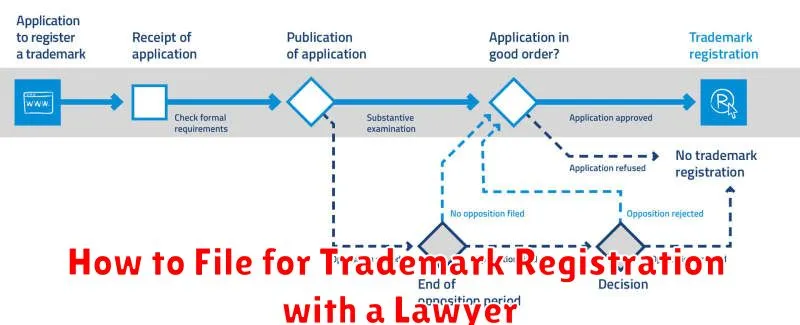
A trademark is a symbol, design, or phrase legally registered to represent a company or product. Securing a trademark can be a complex process, and having an experienced intellectual property lawyer by your side can ensure the process runs smoothly and successfully.
Here’s how to file for trademark registration with a lawyer:
- Consult with an IP lawyer: The first step is to schedule a consultation with a lawyer specializing in intellectual property. They can assess your trademark and determine its registrability, as well as guide you through the process.
- Conduct a trademark search: Your lawyer will conduct a comprehensive search to ensure the trademark you choose is not already in use. This prevents potential conflicts and legal issues down the road.
- Prepare the trademark application: Your lawyer will draft the trademark application, including the proper classifications, descriptions, and supporting documentation.
- File the trademark application: Once the application is finalized, your lawyer will file it with the United States Patent and Trademark Office (USPTO).
- Respond to any office actions: The USPTO may issue office actions requiring additional information or modifications to the application. Your lawyer will handle all communication and revisions.
- Maintain the trademark: After the trademark is registered, your lawyer can assist you with ongoing maintenance requirements, such as renewal filings and monitoring for potential infringement.
Working with an IP lawyer simplifies the trademark registration process, minimizing the risk of errors and ensuring your rights are protected. Their expertise guarantees that your application is strong and has the best chance of success.
Questions to Ask an Intellectual Property Attorney Before Hiring
Hiring an intellectual property (IP) attorney is a crucial step in protecting your creative works. However, choosing the right attorney is essential. Before you commit to an attorney, there are several important questions you should ask to ensure they are the right fit for your needs.
What is your experience in my specific area of IP?
IP law covers a wide range of areas, including trademarks, patents, copyrights, and trade secrets. It’s important to find an attorney who specializes in the type of IP protection you need. For example, if you’re developing a new invention, you’ll want to find an attorney with expertise in patent law. If you’re creating a brand, you’ll need an attorney with trademark law experience.
What are your fees?
IP attorneys often charge hourly rates, but some may offer flat fees for specific services. Discuss the attorney’s fees and payment terms upfront. You should also ask about any additional expenses, such as filing fees, court costs, and travel expenses. It’s also beneficial to ask if they offer a free consultation.
How will you communicate with me?
Clear communication is essential when working with an attorney. Ask the attorney about their communication style, how often they will update you on the progress of your case, and how they handle questions or concerns.
What is your track record?
An attorney’s past success can give you an idea of their skills and experience. Ask the attorney to provide you with examples of their previous cases or client testimonials. You can also research the attorney’s reputation online.
Do you have any conflicts of interest?
It’s important to make sure the attorney doesn’t have any conflicts of interest that could affect their ability to represent you effectively. For example, the attorney may represent a competitor or have a previous relationship with a party involved in your case.
What are your recommendations for protecting my IP?
This question allows the attorney to demonstrate their expertise and provide valuable insights into protecting your IP. Ask for specific recommendations tailored to your situation and industry.
By asking these questions, you can make an informed decision about which IP attorney is right for you. This will give you the best chance of securing strong legal protection for your valuable creative works.
How to Avoid Intellectual Property Theft with Legal Help
Intellectual property theft is a serious problem that can cost you a lot of money and time. If you’re a creative professional, it’s important to take steps to protect your work. Intellectual property lawyers can help you avoid intellectual property theft by providing you with legal advice and representation.
Here are some ways that intellectual property lawyers can help you avoid theft:
- Registering your trademarks and copyrights. This is the most important step you can take to protect your intellectual property. By registering your trademarks and copyrights, you create a public record of your ownership, which can help you enforce your rights if someone tries to steal your work.
- Drafting and negotiating contracts. Contracts are essential for protecting your intellectual property. Intellectual property lawyers can help you draft and negotiate contracts that clearly define your rights and obligations.
- Monitoring for infringement. Intellectual property lawyers can help you monitor for infringement by searching for instances of your work being used without your permission. If you find that your work is being infringed, you can then take legal action to stop the infringement.
- Protecting your intellectual property online. Intellectual property lawyers can help you protect your intellectual property online by advising you on best practices for digital security and copyright protection.
By taking these steps, you can significantly reduce the risk of having your intellectual property stolen.
The Role of Lawyers in International Intellectual Property Law
International intellectual property law is a complex and ever-evolving field that protects your creative works across borders. Intellectual property lawyers play a crucial role in navigating this intricate landscape, ensuring your rights are protected and your creations are safeguarded.
Their expertise extends beyond national boundaries, encompassing international treaties, agreements, and conventions. They understand the nuances of different legal systems and the intricacies of enforcing intellectual property rights globally. This global perspective is essential for businesses and individuals seeking to protect their innovations, brands, and creative works in the international marketplace.
International IP lawyers provide a range of services, including:
- Registration and Enforcement: Guiding clients through the process of registering trademarks, patents, copyrights, and designs in various countries.
- Licensing and Agreements: Negotiating and drafting international licensing agreements to allow others to use your intellectual property, ensuring fair compensation and protection.
- Dispute Resolution: Representing clients in international intellectual property disputes, including infringement lawsuits and domain name disputes.
- Strategic Advice: Providing guidance on international intellectual property strategy, including portfolio management, risk assessment, and compliance with international regulations.
In a world increasingly reliant on global collaboration and innovation, the role of intellectual property lawyers in international law is paramount. They act as your trusted advisors, safeguarding your creative works and ensuring their value is recognized and protected worldwide.
Why You Need a Lawyer to Protect Your Inventions
Your inventions are the fruits of your creativity and hard work. You’ve poured your time and resources into developing something unique and potentially valuable. To protect your investment and reap the rewards of your innovation, you need a strong legal foundation – and that’s where intellectual property lawyers come in.
Here’s why seeking legal counsel is crucial for safeguarding your inventions:
- Secure Your Rights: An IP lawyer can guide you through the process of obtaining patents, trademarks, and copyrights, legally solidifying your ownership of your invention and providing you with exclusive rights to use, sell, and license it.
- Prevent Infringement: IP lawyers can identify potential infringements on your intellectual property, take proactive measures to stop them, and represent you in legal proceedings to protect your rights.
- Maximize Your Value: A skilled lawyer can help you strategize for commercialization, licensing, and monetizing your invention, maximizing its potential value in the marketplace.
- Avoid Costly Mistakes: The intricacies of intellectual property law are complex. A lawyer can navigate these complexities, ensuring you comply with all regulations and avoid potentially costly legal missteps.
- Negotiate Strong Agreements: When licensing or selling your invention, an IP lawyer will negotiate favorable terms that protect your interests and ensure fair compensation for your innovation.
Investing in legal counsel is an investment in your future success. By protecting your inventions, you safeguard your hard work, secure your financial interests, and pave the way for a brighter future for your innovations.
The Importance of Legal Guidance in Licensing Agreements
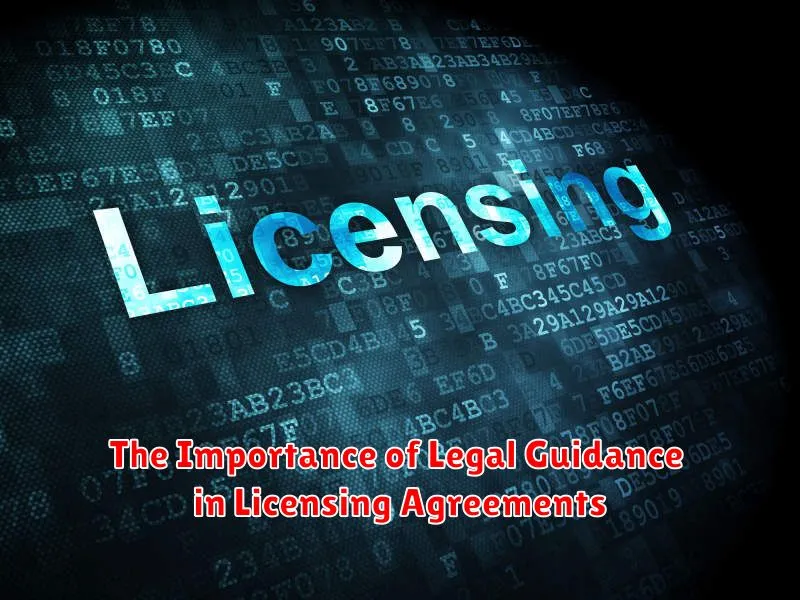
Licensing agreements are crucial for creators looking to share their intellectual property (IP) while retaining ownership. Whether you’re a musician releasing your music, an artist selling prints of your artwork, or a developer licensing your software, a well-structured agreement is essential for safeguarding your rights and maximizing your profit potential. This is where legal guidance comes in.
Intellectual property lawyers specialize in understanding the complexities of licensing agreements. They possess the knowledge and expertise to ensure that your agreement protects your interests, defines the scope of rights granted, and clarifies the terms of royalty payments and other financial considerations. This includes:
- Negotiating favorable terms for the licensor
- Clarifying the duration of the license and its renewal options
- Defining the specific rights granted to the licensee
- Ensuring the agreement complies with relevant copyright and trademark laws
- Addressing potential disputes and resolving them effectively
Licensing agreements can be intricate, with numerous clauses and legal jargon. Without legal guidance, creators may inadvertently compromise their rights or enter into unfavorable terms that can limit their future opportunities. A lawyer can act as your advocate and ensure your agreement is fair and advantageous for your creative endeavors.
In addition to protecting your rights, legal guidance also helps to prevent costly mistakes and future disputes. By carefully reviewing the agreement and addressing potential issues before signing, you can mitigate legal risks and foster a smoother working relationship with your licensees. This can save you time, money, and unnecessary headaches in the long run.
How Intellectual Property Attorneys Negotiate Settlements
When an intellectual property dispute arises, negotiation often plays a crucial role in resolving the matter outside of court. Intellectual property attorneys are skilled negotiators, leveraging their knowledge of the law, the client’s business objectives, and the strengths and weaknesses of the case to achieve a favorable outcome.
The negotiation process typically begins with initial communication between the parties involved, facilitated by their attorneys. This communication involves exchanging information about the dispute, including the nature of the alleged infringement, the potential damages, and the parties’ respective positions.
Settlement negotiations involve exploring various options and concessions to reach an agreement that is acceptable to both parties. Attorneys may utilize tactics such as mediation, where a neutral third party helps facilitate communication and compromise. They may also engage in demand and counter-offer exchanges, gradually narrowing the gap between the parties’ initial positions.
The goal of negotiation is to reach a mutually beneficial agreement that avoids the costs and uncertainties associated with litigation. Settlements may involve a range of outcomes, including:
- Licensing agreements, allowing the infringer to use the intellectual property under specific terms and conditions.
- Financial compensation, such as a lump sum payment or royalties.
- Cessation of infringing activities, with the infringer agreeing to stop using or distributing the protected intellectual property.
Intellectual property attorneys play a critical role in navigating the complexities of settlement negotiations. They ensure that their clients’ interests are protected, and they help to achieve a resolution that is fair and advantageous.
How to Communicate with Your Intellectual Property Lawyer
Communicating effectively with your intellectual property lawyer is crucial for a successful outcome. It ensures that they understand your needs, concerns, and objectives. Here are some essential tips:
Be Clear and Concise: When explaining your situation, use precise language and avoid jargon. Provide specific details about your creative works, the nature of the protection you seek, and any relevant background information.
Ask Questions: Don’t hesitate to ask questions about anything you don’t understand. Your lawyer is there to guide you and provide clarity. Don’t be afraid to express your doubts or uncertainties.
Provide Necessary Documents: Gather all relevant documents, including agreements, contracts, prototypes, and any evidence of your creative work. This helps your lawyer understand the legal context and assess your situation accurately.
Be Responsive: Respond promptly to your lawyer’s requests for information or clarification. Timely communication keeps the process moving smoothly and prevents delays.
Be Realistic: While your lawyer will strive to protect your interests, they can’t guarantee a specific outcome. Be realistic about the legal process and potential challenges.
Maintain Open Communication: Throughout the process, maintain open communication with your lawyer. This allows for regular updates, addressing any concerns, and ensuring that you’re on the same page.
Effective communication with your intellectual property lawyer is the foundation of a strong legal strategy. By following these tips, you can build a successful working relationship and ensure that your creative works receive the protection they deserve.
The Legal Process in Defending Intellectual Property Rights
Protecting your intellectual property (IP) rights is crucial for creators and businesses alike. It ensures that you can control the use of your creative works and reap the benefits of your innovations. Intellectual property lawyers play a critical role in this process, navigating the complexities of the legal system to safeguard your rights.
The legal process of defending IP rights often begins with registration. This involves filing formal applications with government agencies to obtain official recognition of your rights. For example, trademarks are registered with the U.S. Patent and Trademark Office, while patents are granted by the U.S. Patent and Trademark Office for inventions.
Once you have registered your IP, you can take legal action to enforce your rights if someone infringes on them. Enforcement involves identifying the infringer, sending cease and desist letters, and potentially pursuing litigation in court. IP lawyers can advise on the best course of action and represent you in legal proceedings.
In addition to registration and enforcement, monitoring is essential to identify potential infringements. This includes searching for unauthorized use of your trademarks, copyrights, or patents online and in the marketplace. IP lawyers can assist with monitoring services and alert you to potential threats.
Finally, preventive measures can help minimize the risk of infringement. These include conducting due diligence before launching a new product or service, using clear and concise licensing agreements, and educating employees about IP protection policies. IP lawyers can provide guidance and advice on these crucial aspects of IP protection.